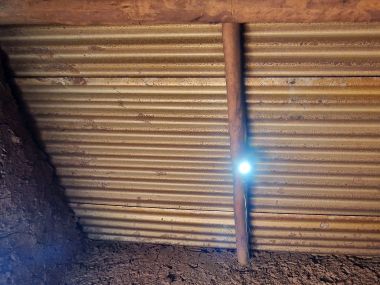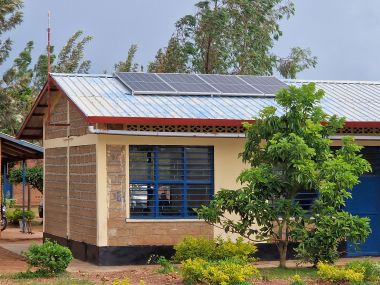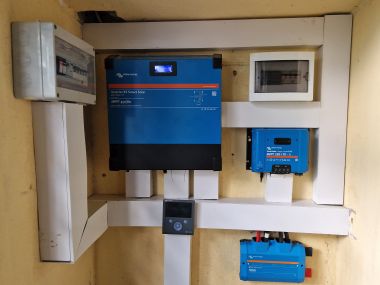Clean Energy
Electricity is the key
Almost one billion people worldwide have no access to electricity. Yet electricity is the key to economic development, modern information and communication technologies, education and health care.
Electricity also works without a grid - with solar!
In the pilot village, different approaches of decentralised off-grid solar systems are being tested with the aim of area-wide electrification. In households, we use decentralised solar home systems to provide basic power for lighting and charging mobile devices.


We also build larger solar systems with batteries, e.g. for the electrification of schools or for so-called ‘productive use’ applications to generate income.


What electricity does
- Electric lighting replaces unhealthy technologies such as paraffin lamps
- Electric lighting prolongs the day (in the tropics, night begins around 6 pm). Electric lighting makes it possible, for example, for pupils to still do homework or read after 6 pm.
- In sub-Saharan Africa, the electrification rate is about one third of households. In contrast, more than 80% of households have a simple mobile phone or a smartphone. The share of (internet-enabled) smartphones is continuously increasing. Owning a mobile phone or smartphone, which can ideally be charged at home, is important for communication and participation, increasingly also for improving income.
- Electric outdoor lighting increases the sense of security
- Solar home systems can also power computers, tablets, radios and televisions, which is also important for participation and also education.
- Income can be generated or food secured through the use of "productive use" equipment such as refrigerators, mobile phone charging stations, mills, pumps, irrigation systems, welding equipment, large televisions or projectors for film screenings.
Explanation Solar Home System (SHS)
Cooking makes you sick?
Three billion people use cooking appliances whose exhaust fumes are harmful to the health of people in the household. Worldwide, four million people die each year from respiratory diseases caused in this way. In addition, the use of firewood and charcoal contributes to deforestation.
In the very rural part of our project area, people cook with wood on the traditional three-stone fireplaces, mostly indoors without a good smoke outlet. Charcoal, gas and ethanol are too expensive, are therefore not bought and are only offered, if at all, in the market towns and larger urban centres. Solar home systems, which we also support, do not provide enough power for cooking. So the pragmatic first choice is an optimised wood-fired cooking stove.
We have entered into a partnership with the local organisation Safer Rwanda, which, with the support of the German organisation Atmosfair, sells optimised stainless steel cooking stoves called Save80. These are supplied with two perfectly fitting pots and a ‘Wonderbox’. This is a warming box with a lid into which the pots fit exactly.


To cook beans, they are heated on the cooking stove. As soon as the water boils with the beans, it is placed in the Wonderbox and can continue to simmer for hours without supervision. The Save80 cooking stoves use 80% less firewood than traditional three-stone fireplaces. In addition, the wood is optimally burnt in the small combustion chamber so that very little smoke is produced. The Save80 stoves can be used indoors and outdoors and are easy to transport.
What optimised cooking appliances do
- No health impairment due to complete or extensive avoidance of exhaust gases that are harmful to health
- Avoiding deforestation for the purpose of fuel procurement
- Savings in (energy) costs per meal prepared
- Greater safety in use, e.g. avoidance of fires or accidental ingestion of kerosene by children.
- It is also desirable to avoid long transport routes and save the time required for collecting firewood and the cooking process itself
- Danger of sexual assaults on children and young people when collecting firewood is reduced
All our fields of action
News Clean Energy

448 households now have electricity for the first time
26 July 2024
448 households now have electricity for the first time!
Thanks to EDP's "Access to Energy Program", over 2,200 people in 448 households have lights in their homes, can charge their mobile phones and listen to the radio.

Gatora Primary School has electricity and smart classroom now
22 December 2023
Gatora Primary School has electricity and smart classroom now!
The Youth Foundation of Saxony made it possible to electrify Gatora Primary School and equip it with 48 laptops, a projector and a print/copy device.

Funding commitment for the electrification of the Gatora primary school received
1 September 2023
Funding commitment for the electrification of the Gatora Primary School received!
With its "genialsozial" programme, the Youth Foundation of Saxony is funding the electrification of the "Ecole Primaire Gatora", the installation of a computer room and various training programmes.

Electrification of Cyirabo Primary School completed
11 August 2023
Electrification of Cyirabo Primary School completed!
A Rwandan solar company completed the solar installation with batteries and the AC electrical installation with lamps and sockets after three weeks of construction.

Two more primary schools are to be electrified
31 January 2023
Two more primary schools are to be electrified!
The foundation has included two more primary schools in the electrification programme. Both schools are also to be equipped with laptops.

The primary school now has solar power!
09 September 2022
The primary school now has solar power!
In cooperation with a local Rwandan solar company, the electrification of the "Juru Primary School" with almost 900 pupils and 20 classrooms was completed today.
20 April 2022 95% of households now have electricity!
24 September 2021 Household electrification via local savings groups




